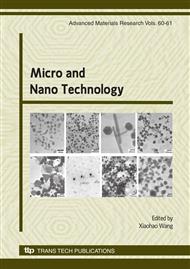p.270
p.274
p.278
p.283
p.288
p.293
p.298
p.303
p.307
Investigation of Thermal Bonding on PMMA Capillary Electrophoresis Chip
Abstract:
PMMA, Capillary Electrophoresis, Thermal bonding, Factor, Deformation. Abstract. In this paper, using the powder hot embossing machine, the effects of the bonding temperature, pressure and time on the deformation of microchannel dimensions is studied systematically. The bonding temperature is mainly influence factor on the deformation of microchannel determined by the method of orthogonal experiment. Some mathematical models are described to optimize the thermal bonding process parameters. According theory and experimental curve, the optimal experimental model (83°C, 0.4Mpa and 7 min) is suggested. Under the process parameters the deformation of crossing section dimension before and after thermal bonding is 37.8%. The channel is successfully sealed underneath with a thin foil 30μm thickness PMMA for contactless conductivity detection. The entire fabrication methodology may also be useful for preparation of other polymer microfluidic systems. Finally, the performance of the PMMA chip is demonstrated to separate continuously K+ ions using the contactless conductivity detection.
Info:
Periodical:
Pages:
288-292
DOI:
Citation:
Online since:
January 2009
Authors:
Price:
Сopyright:
© 2009 Trans Tech Publications Ltd. All Rights Reserved
Share:
Citation:


